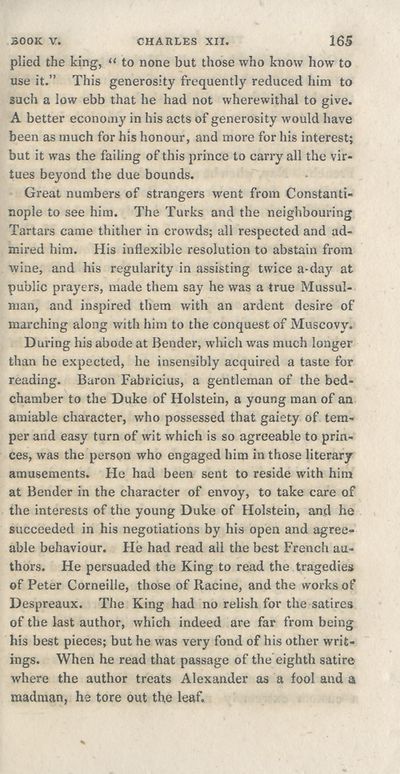Download files
Complete book:
Individual page:
Thumbnail gallery: Grid view | List view

BOOK V. CHARLES XII. 165
plied the king, “ to none but those who know how to
use it.” This generosity frequently reduced him to
such a low ebb that he had not wherewithal to give.
A better economy in his acts of generosity would have
been as much for his honour, and more for his interest;
but it was the failing of this prince to carry all the vir¬
tues beyond the due bounds.
Great numbers of strangers went from Constanti¬
nople to see him. The Turks and the neighbouring
Tartars came thither in crowds; all respected and ad¬
mired him. His inflexible resolution to abstain from
wine, and his regularity in assisting twice a-day at
public prayers, made them say he was a true Mussul¬
man, and inspired them with an ardent desire of
marching along with him to the conquest of Muscovy.
During his abode at Bender, which was much longer
than he expected, he insensibly acquired a taste for
reading. Baron Fabricius, a gentleman of the bed¬
chamber to the Duke of Holstein, a young man of an
amiable character, who possessed that gaiety of tem¬
per and easy turn of wit which is so agreeable to prin¬
ces, was the person who engaged him in those literary
amusements. He had been sent to reside with him
at Bender in the character of envoy, to take care of
the interests of the young Duke of Holstein, and he
succeeded in his negotiations by his open and agree¬
able behaviour. He had read all the best French au¬
thors. He persuaded the King to read the tragedies
of Peter Corneille, those of Racine, and the works of
Despreaux. The King had no relish for the satires
of the last author, which indeed are far from being
his best pieces; but he was very fond of his other writ¬
ings. When he read that passage of the eighth satire
where the author treats Alexander as a fool and a
madman, he tore out the leaf.
plied the king, “ to none but those who know how to
use it.” This generosity frequently reduced him to
such a low ebb that he had not wherewithal to give.
A better economy in his acts of generosity would have
been as much for his honour, and more for his interest;
but it was the failing of this prince to carry all the vir¬
tues beyond the due bounds.
Great numbers of strangers went from Constanti¬
nople to see him. The Turks and the neighbouring
Tartars came thither in crowds; all respected and ad¬
mired him. His inflexible resolution to abstain from
wine, and his regularity in assisting twice a-day at
public prayers, made them say he was a true Mussul¬
man, and inspired them with an ardent desire of
marching along with him to the conquest of Muscovy.
During his abode at Bender, which was much longer
than he expected, he insensibly acquired a taste for
reading. Baron Fabricius, a gentleman of the bed¬
chamber to the Duke of Holstein, a young man of an
amiable character, who possessed that gaiety of tem¬
per and easy turn of wit which is so agreeable to prin¬
ces, was the person who engaged him in those literary
amusements. He had been sent to reside with him
at Bender in the character of envoy, to take care of
the interests of the young Duke of Holstein, and he
succeeded in his negotiations by his open and agree¬
able behaviour. He had read all the best French au¬
thors. He persuaded the King to read the tragedies
of Peter Corneille, those of Racine, and the works of
Despreaux. The King had no relish for the satires
of the last author, which indeed are far from being
his best pieces; but he was very fond of his other writ¬
ings. When he read that passage of the eighth satire
where the author treats Alexander as a fool and a
madman, he tore out the leaf.
Set display mode to:
![]() Universal Viewer |
Universal Viewer | ![]() Mirador |
Large image | Transcription
Mirador |
Large image | Transcription
| Antiquarian books of Scotland > Kings & rulers > History of Charles XII, King of Sweden > (183) |
|---|
| Permanent URL | https://digital.nls.uk/115023206 |
|---|
| Description | Thousands of printed books from the Antiquarian Books of Scotland collection which dates from 1641 to the 1980s. The collection consists of 14,800 books which were published in Scotland or have a Scottish connection, e.g. through the author, printer or owner. Subjects covered include sport, education, diseases, adventure, occupations, Jacobites, politics and religion. Among the 29 languages represented are English, Gaelic, Italian, French, Russian and Swedish. |
|---|

